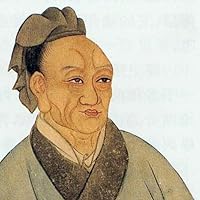Chinese History Quotes
Quotes tagged as "chinese-history"
Showing 1-16 of 16

“She succeeds because she is loved and respected. - Kailin Gow, Amazon Lee and The Red Jade General Lady Liang of Song”
―
―

“When the moon reaches fullness, it begins to wane.
月滿則虧”
― The Grand Scribe's Records, Vol. 1: The Basic Annals of Pre-Han China
月滿則虧”
― The Grand Scribe's Records, Vol. 1: The Basic Annals of Pre-Han China

“You wound me
I remove his hand and meet him in the eye. "No worse than I already have.”
― Strike the Zither
I remove his hand and meet him in the eye. "No worse than I already have.”
― Strike the Zither

“In 1957, the then-emperor, Qianlong, who ruled China for sixty years (1736-95) and is often referred to as 'Qianlong the Magnificent' for his achievements, closed the door of the country, leaving only one port open for trade, Canton.”
― Empress Dowager Cixi: The Concubine Who Launched Modern China
― Empress Dowager Cixi: The Concubine Who Launched Modern China

“It's a terrific book and I can't wait for the movie," says Phillip Adams on Late Night Live, ABC Radio National.”
― Mission to China: How an Englishman Brought the West to the Orient
― Mission to China: How an Englishman Brought the West to the Orient

“Official historians have long depicted wu zetian as a sort of chinese version of the Red Queen from The Alice and Wonderland, by focusing on her secret police and fondness by bumping off enemies. "And she slept her way to the top".
An interesting angle given that her brief dynasty was one of the most prosperious periods in many respects (in terms of peace, arts, and social progress.)
On the other hand, what is always pointed out (and emphasized as fact) is that she was fearsome, ambitious, and ruthless. Common (and valued)character traits in just about every emperor...but clearly not easy to digest in an empress”
― Brazen: Rebel Ladies Who Rocked the World
An interesting angle given that her brief dynasty was one of the most prosperious periods in many respects (in terms of peace, arts, and social progress.)
On the other hand, what is always pointed out (and emphasized as fact) is that she was fearsome, ambitious, and ruthless. Common (and valued)character traits in just about every emperor...but clearly not easy to digest in an empress”
― Brazen: Rebel Ladies Who Rocked the World

“As the four girls were taking her father's life, she had tried to rush onto the stage. But two old university janitors held her down and whispered into her ear that she would lose her own life if she went.”
―
―

“Although his log entries do not speak of America per se, a chart created by Admiral Zheng was used to make a detailed map of the world. A copy of this map, drawn in 1763, was found in a second-hand bookshop and was offered as evidence that Zheng’s fleet was the first to discover America. At the age of 61, Admiral Zheng died aboard ship and befittingly was buried at sea.
The Chinese sailed on very large ships, some of which were 450 feet long and 180 feet wide, in fact larger than any other of that time. They were certainly large enough to circumnavigate the world. Typical donut-shaped stone anchors of the type used by the Chinese have been found off the coast of California, as well as the west coast of South America, substantiating their claims.
Zheng’s journal states that it took 270 days to sail from China to California on his voyage across the Pacific. On another expedition, he described rounding the bottom of Africa and sailing into the Atlantic, to what could well have been South America and the Caribbean.”
―
The Chinese sailed on very large ships, some of which were 450 feet long and 180 feet wide, in fact larger than any other of that time. They were certainly large enough to circumnavigate the world. Typical donut-shaped stone anchors of the type used by the Chinese have been found off the coast of California, as well as the west coast of South America, substantiating their claims.
Zheng’s journal states that it took 270 days to sail from China to California on his voyage across the Pacific. On another expedition, he described rounding the bottom of Africa and sailing into the Atlantic, to what could well have been South America and the Caribbean.”
―

“Folks care less about which door Chinese people use nowadays, compared with when the laborers were shipped in to replace the field slaves after the war. Perhaps whites feel the same way about us as they do about ladybugs: A few are fine, but a swarm turns the stomach”
― The Downstairs Girl
― The Downstairs Girl

“Sometimes, to the strains of licentious music, he made Lao Ai walk along with a wheel of tong-wood attached to his penis, and he ensured that the Queen Dowager heard about it so that she might be tempted.”
―
―

“What's wrong with China?" Dr. Frene demanded of me almost immediately, after Nym introduced us. "Why were the Chinese able to invent everything and develop nothing? Why did Chinese civilization undergo a menopause? What happened to China's creative power?"
"Maybe China atrophied because of lack of competition," I suggested weakly.
"Nonsense!" he screamed mildly. "China is a case of stability achieved at the expense of stifling the individual. The society lives but the creative personality dies. Taoistic passivism and fatalism on the one hand, bastard-Confucianism on the other: ancestor-worship, adoration of the male offspring, worship of the phallus! Regimentation of the mind by the classics on the one hand, dissipation of sense power and early and constant cohabitation on the other hand. The mind becomes a perfect mechanical instrument but remains a blank because the senses are dead which should serve and simulate it!”
― Journey to the Beginning
"Maybe China atrophied because of lack of competition," I suggested weakly.
"Nonsense!" he screamed mildly. "China is a case of stability achieved at the expense of stifling the individual. The society lives but the creative personality dies. Taoistic passivism and fatalism on the one hand, bastard-Confucianism on the other: ancestor-worship, adoration of the male offspring, worship of the phallus! Regimentation of the mind by the classics on the one hand, dissipation of sense power and early and constant cohabitation on the other hand. The mind becomes a perfect mechanical instrument but remains a blank because the senses are dead which should serve and simulate it!”
― Journey to the Beginning
“There were quite a few returnees from Hong Kong and Macau, but... most of the two thousand plus students at our school came from South and Southeat Asia: Vietnam, Indonesia, Thailand, Malaysia, Cambodia, Laos, the Philippines. They had all come back for pretty much the same reason: a strong anti-Chinese sentiment mushrooming in their countries, which had recently freed themselves from colonialism… Chinese were targeted for attack by the newly empowered natives because under colonial rule the Chinese had enjoyed a social and economic status higher than that of the indigenous population.”
― The Bitter Sea: Coming of Age in a China Before Mao
― The Bitter Sea: Coming of Age in a China Before Mao
“The national mobilization to exterminate the "Four Pests"... was the first of a series of disasters precipitated by the Great Helmsman after the Anti-Rightist Campaign.
"National mobilisation" meant that all 500 million people in China stopped work in order to take up a single specific task — in this case, the extermination of sparrows, flies, mosquitoes, and rats.”
― The Bitter Sea: Coming of Age in a China Before Mao
"National mobilisation" meant that all 500 million people in China stopped work in order to take up a single specific task — in this case, the extermination of sparrows, flies, mosquitoes, and rats.”
― The Bitter Sea: Coming of Age in a China Before Mao
“British colonial disdain for human rights even left its mark on the English language. The word “coolie” was borrowed from a Chinese word that literally means “bitter labor.” The Romanized first syllable coo means “bitter” and the second syllable lie mimics the pronunciation of the Chinese logograph that means “labor.”
This Chinese word sprang into existence shortly after the Opium War in the nineteenth century when Britain annexed several territories along the eastern seaboard of China. Those territories included Hong Kong, parts of Shanghai, Canton city (Guangzhou) and parts of Tianjin, a seaport near Beijing.
In those newly acquired territories, the British employed a vast number of manual laborers who served as beasts of burden on the waterfront in factories and at train stations. The coolies’ compensation was opium, not money.
The British agency and officers that conceived this unusual scheme of compensation—opium for back-breaking hard labor—were as pernicious and ruthless as they were clever and calculating. Opium is a palliative drug. An addict becomes docile and inured to pain. He has no appetite and only craves the next fix. In the British colonies and concessions, the colonizers, by paying opium to the laborers for their long hours of inhumane, harsh labor, created a situation in which the Chinese laborers toiled obediently and never complained about the excessive workload or the physical devastation. Most important of all, the practice cost the employers next to nothing to feed and house the laborers, since opium suppressed the appetite of the addicts and made them oblivious to pain and discomfort. What could be better or more expedient for the British colonialists whose goal was to make a quick fortune?
They had invented the most efficient and effective way to accumulate capital at a negligible cost in a colony. The only consequence was the loss of lives among the colonial subjects—an irrelevant issue to the colonialists.
In addition to the advantages of this colonial practice, the British paid a pittance for the opium. In those days, opium was mostly produced in another British colony, Burma, not far from China. The exploitation of farmhands in one colony lubricated the wheels of commerce in another colony. On average, a coolie survived only a few months of the grim regime of harsh labor and opium addiction. Towards the end, as his body began to break down from malnutrition and overexertion, he was prone to cardiac arrest and sudden death. If, before his death, a coolie stumbled and hurt his back or broke a limb, he became unemployed. The employer simply recruited a replacement.
The death of coolies in Canton, Hong Kong, Shanghai and other coastal cities where the British had established their extraterritorial jurisdiction during the late 19th century was so common that the Chinese accepted the phenomenon as a routine matter of semi-colonial life. Neither injury nor death of a coolie triggered any compensation to his family.
The impoverished Chinese accepted injury and sudden death as part of the occupational hazard of a coolie, the “bitter labor.” “Bitter” because the labor and the opium sucked the life out of a laborer in a short span of time.
Once, a 19th-century British colonial officer, commenting on the sudden death syndrome among the coolies, remarked casually in his Queen’s English, “Yes, it is unfortunate, but the coolies are Chinese, and by God, there are so many of them.” Today, the word “coolie” remains in the English language, designating an over-exploited or abused unskilled laborer.”
― The Turbulent Sea: Passage to a New World
This Chinese word sprang into existence shortly after the Opium War in the nineteenth century when Britain annexed several territories along the eastern seaboard of China. Those territories included Hong Kong, parts of Shanghai, Canton city (Guangzhou) and parts of Tianjin, a seaport near Beijing.
In those newly acquired territories, the British employed a vast number of manual laborers who served as beasts of burden on the waterfront in factories and at train stations. The coolies’ compensation was opium, not money.
The British agency and officers that conceived this unusual scheme of compensation—opium for back-breaking hard labor—were as pernicious and ruthless as they were clever and calculating. Opium is a palliative drug. An addict becomes docile and inured to pain. He has no appetite and only craves the next fix. In the British colonies and concessions, the colonizers, by paying opium to the laborers for their long hours of inhumane, harsh labor, created a situation in which the Chinese laborers toiled obediently and never complained about the excessive workload or the physical devastation. Most important of all, the practice cost the employers next to nothing to feed and house the laborers, since opium suppressed the appetite of the addicts and made them oblivious to pain and discomfort. What could be better or more expedient for the British colonialists whose goal was to make a quick fortune?
They had invented the most efficient and effective way to accumulate capital at a negligible cost in a colony. The only consequence was the loss of lives among the colonial subjects—an irrelevant issue to the colonialists.
In addition to the advantages of this colonial practice, the British paid a pittance for the opium. In those days, opium was mostly produced in another British colony, Burma, not far from China. The exploitation of farmhands in one colony lubricated the wheels of commerce in another colony. On average, a coolie survived only a few months of the grim regime of harsh labor and opium addiction. Towards the end, as his body began to break down from malnutrition and overexertion, he was prone to cardiac arrest and sudden death. If, before his death, a coolie stumbled and hurt his back or broke a limb, he became unemployed. The employer simply recruited a replacement.
The death of coolies in Canton, Hong Kong, Shanghai and other coastal cities where the British had established their extraterritorial jurisdiction during the late 19th century was so common that the Chinese accepted the phenomenon as a routine matter of semi-colonial life. Neither injury nor death of a coolie triggered any compensation to his family.
The impoverished Chinese accepted injury and sudden death as part of the occupational hazard of a coolie, the “bitter labor.” “Bitter” because the labor and the opium sucked the life out of a laborer in a short span of time.
Once, a 19th-century British colonial officer, commenting on the sudden death syndrome among the coolies, remarked casually in his Queen’s English, “Yes, it is unfortunate, but the coolies are Chinese, and by God, there are so many of them.” Today, the word “coolie” remains in the English language, designating an over-exploited or abused unskilled laborer.”
― The Turbulent Sea: Passage to a New World
All Quotes
|
My Quotes
|
Add A Quote
Browse By Tag
- Love Quotes 99k
- Life Quotes 78k
- Inspirational Quotes 74.5k
- Humor Quotes 43.5k
- Philosophy Quotes 30.5k
- Inspirational Quotes Quotes 28k
- God Quotes 26.5k
- Truth Quotes 24k
- Wisdom Quotes 24k
- Romance Quotes 23.5k
- Poetry Quotes 22.5k
- Life Lessons Quotes 21.5k
- Death Quotes 20k
- Quotes Quotes 19.5k
- Happiness Quotes 19k
- Hope Quotes 18k
- Faith Quotes 18k
- Inspiration Quotes 17k
- Spirituality Quotes 15.5k
- Motivational Quotes 15k
- Religion Quotes 15k
- Relationships Quotes 15k
- Life Quotes Quotes 15k
- Writing Quotes 14.5k
- Love Quotes Quotes 14.5k
- Success Quotes 13.5k
- Motivation Quotes 13k
- Time Quotes 12.5k
- Science Quotes 12k
- Motivational Quotes Quotes 11.5k

